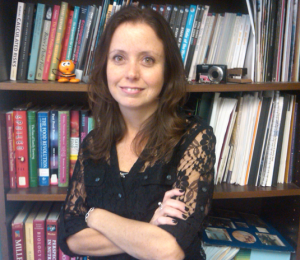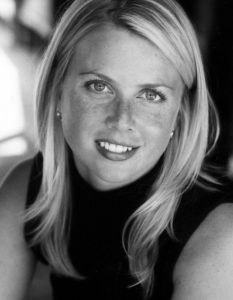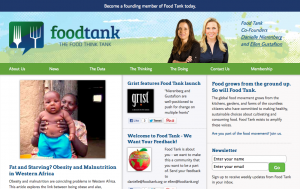(banner photo © timsackton/flickr)
In a world where one billion people go hungry and 1.5 billion people are obese, the time has come to figure out how to fix a very broken food system. Danielle Nierenberg and Ellen Gustafson, two women who have dedicated much of their careers to studying agriculture and sustainability around the world, hope that the answers will be deposited in their new think tank.

Danielle Nierenberg talks about Food Tank’s mission: to get vital information to the right people within the global food system.
Food Tank launches today, an ambitious yet approachable depository of knowledge based entirely around the way we grow, harvest, distribute and eat food. Global in scope, the Food Tank will provide a modern library dedicated to issues of agriculture, livestock, transportation, plant science, malnutrition, obesity, foodservice, food diversity and food policy. Underneath it all, avenues of radical change will be built, which the founders hope will ensure a healthy food supply to all even in tough times ahead.
Danielle Nierenberg took a few minutes to talk to us in the busy day just prior to launch.
Toque: Has our obsession with food helped illustrate the need for a better system?
DN: The foodie movement in this country in the last 15 years has done so much to propel these issues to the forefront. But it’s very white and very elite. ‘Did you go to this restaurant that only serves organic and local?’ We need to talk about access and affordability and the right to food no matter how much money we have.
Toque: How are obesity, hunger, waste and sustainable agriculture all connected? Why have we seen so many problems in these areas?
DN: The reason these are connected is their roots all go to the same thing. Our food system is broken. It is designed to raise calories and do things in volume. So we grow starchy things like soy and maize and wheat. What makes these stable crops nutritious? Enormous resources go to these crops; vegetable production gets very little. This leads to the hunger issue and to the 1.5 b who are obese.

Ellen Gustafson, Nierenberg’s partner and co-founder, is a successful social entrepreneur and founded the 30 Project, a partial model for Food Tank.
Only in the past few years has food waste been at the forefront. In 1974 there was a call for 50 percent reduction in food waste and we’re not even close. Developing countries lose 40 percent of their food from lack of good roads and cooling stations. In the U.S. we buy too much food. We don’t practice portion control, food is cheap. The waste generates methane and ultimately contributes to climate change.
Toque: So there is a profound disconnect between everyone within the food system.
DN: We don’t value the food, the farmers, the knowledge. Trying to change the metrics is something that Food Tank wants to focus on. In my world the nutritionists aren’t talking to the farmers and the ag distribution people. It’s all about getting the data in one place for everyone to access and to contribute to.
Toque: How will Food Tank be different from other information sources already out there?
DN: There is no serious think tank that focuses on food and agriculture. There are lots of organizations that “sort of” do it but nothing that helps us realize that the information and the precedent we are acting on is wrong. The problems in the developing world are not that much different than what will be happening in the industrialized world.
There is an urgency in bringing everyone together. If not the next 30 years will be very unpleasant. We really need to act now.
Toque: Will there be big players and small players? How does the data contribution of an agribusiness corporation compare to the opinions of a subsistence farmer?
We have so much to learn from farmers in the developing world. They’ve been farming in adverse conditions for a long time now and have learned new ways to get the most from their crops.
DN: Corporations help the cause in a different way. We’ve included a lot of business experts and folks involved in the food system in our outreach. The way to talk about them is to focus on whether the technologies they’ve developed really work. I haven’t seen the benefits of biotechnology and GMO crops in relation to the billions that have been spent on them. I think they are very interesting but we are rushing into them and we should focus on the things that have been proven to work. Many small things have paid off. We want to see investment and funding that would allow them to scale up. There is real interest in this but we need to have the information available.
Toque: What will Food Tank provide? How can visitors become useful members?

DN: It’s going to be very interactive. We will aggregate news from outside sources and run an interactive blog that welcomes guest writers and thoughtful comment. We want it to work like Mashable. The versions will differ based on what you use–tablet, laptop or mobile phone. One of our hopes is to have an innovations database for farmers around the world to share ideas and advice. We have so much to learn from farmers in the developing world. They’ve been farming in adverse conditions for a long time now and have learned new ways to get the most from their crops.
People can follow us on Twitter and nearly every social media platform. We want to reach people in any way that is comfortable for them. We hope to see lots of commentary and advice.
Toque: How has the response to Food Tank been so far?
DN: It’s been truly amazing! We are looking for interns and volunteers around the country and hundreds of resumes have already flooded our office, with more coming each day. We are truly overwhelmed, but in a good way.
Leave a Reply